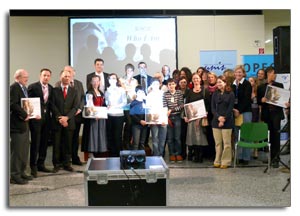 The United Nations Information Service (UNIS) Vienna teamed up with a non-profit organization called Who I Am to celebrate this year's International Mother Language Day through a year-long project that culminated in a Gala presentation at the Vienna International Centre on 25 February 2010. The International Mother Language Day which was proclaimed by UNESCO in 1999, promotes linguistic and cultural diversity and multilingualism. According to UNESCO, languages are the most powerful instruments of preserving and developing a society's tangible and intangible heritage. Acknowledging and celebrating mother tongues serves not only to encourage linguistic diversity and multilingual education but also to develop better awareness of linguistic and cultural traditions throughout the world and inspire solidarity based on understanding, tolerance and dialogue.
The United Nations Information Service (UNIS) Vienna teamed up with a non-profit organization called Who I Am to celebrate this year's International Mother Language Day through a year-long project that culminated in a Gala presentation at the Vienna International Centre on 25 February 2010. The International Mother Language Day which was proclaimed by UNESCO in 1999, promotes linguistic and cultural diversity and multilingualism. According to UNESCO, languages are the most powerful instruments of preserving and developing a society's tangible and intangible heritage. Acknowledging and celebrating mother tongues serves not only to encourage linguistic diversity and multilingual education but also to develop better awareness of linguistic and cultural traditions throughout the world and inspire solidarity based on understanding, tolerance and dialogue.
Who I Am, a non-profit organization, was set up on the belief that in order to achieve world peace, we must first begin by educating children to understand their cultural heritage and identity, as well as to embrace their own mother tongue. Once re-affirmed, children can begin to reach out and to broaden their understanding of other cultures and people who speak other languages. They can then celebrate their unique qualities and find a common ground through the art of human expression.
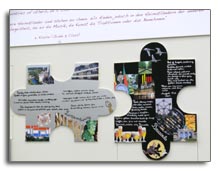 The Project for Mother Tongue and Cultural Identity invited students aged 10-18 to reflect on several key questions around their mother tongue and cultural identity, and challenged them to transform this self-reflective experience into any medium of artistic expression, such as an original composition, art, literature, dance, film, and photography.
The Project for Mother Tongue and Cultural Identity invited students aged 10-18 to reflect on several key questions around their mother tongue and cultural identity, and challenged them to transform this self-reflective experience into any medium of artistic expression, such as an original composition, art, literature, dance, film, and photography.
More than 300 students from 17 Vienna schools submitted over 110 projects. In groups or on their own, they presented works that reflected traditions from 41 different cultures and used 45 languages. The results were on display in the Rotunda of the Vienna International Centre for the duration of the week. A jury composed of UNIS Director Maher Nasser and two representatives -- the inspector for art and the inspector for music -- of the Vienna Board of Education (Stadtschulrat) examined all projects and chose four that were presented at the Gala event held in Rotunda of the Vienna International Centre in the evening of Thursday 25 February 2010. The more than 400-strong audience included participating students, their teachers, parents, UN staff, school officials, representatives of the City of Vienna and the Vienna Board of Education, the diplomatic community and other partners/sponsors.
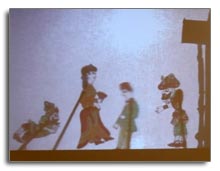 The project "Pictures in my Mind" by four students from the Vienna Bilingual School combined art and original poetry in four different languages all spoken in the Philippines, plus English and German to convey a sense of home and belonging. Grade 11 student Catherine Hegarty of the Vienna International School presented her multimedia work of art "Puzzle". "My piece is a jigsaw puzzle, each one representing a part of "who I am"... I look forward to adding more pieces of cultural experience to my personal jigsaw puzzle."
The project "Pictures in my Mind" by four students from the Vienna Bilingual School combined art and original poetry in four different languages all spoken in the Philippines, plus English and German to convey a sense of home and belonging. Grade 11 student Catherine Hegarty of the Vienna International School presented her multimedia work of art "Puzzle". "My piece is a jigsaw puzzle, each one representing a part of "who I am"... I look forward to adding more pieces of cultural experience to my personal jigsaw puzzle."
Students of the Bundesrealgymnasium 15 chose to represent their distinct cultural heritage by creating artistic presentations of their favourite national dishes called "To the Dish". To round off the presentation, four pupils from the Cooperative Middle School (KMS) Schopenhauergasse performed a traditional Turkish shadow puppet theatre around the issue of feeling foreign and not understanding the local language. A combination of traditional Turkish folklore and Austrian imagery, the little sketch tells the story of Karagöz and Hacivat who travel to Austria to seek their fortune, but only ever meet "Mr. Nixverstehen" (Don't-Understand).
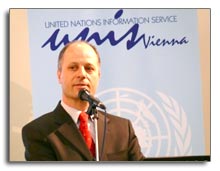 In his statement, UNIS Director Maher Nasser spoke about the increased recognition of the importance of linguistic diversity and multilingualism and the greater appreciation and understanding of the essential roles played by languages in the educational, cultural and economic fabric of today's societies. He expressed the jury's appreciation for the level of reflection and thoughtfulness demonstrated by the works of participating students on "who they are" and how they chose to express themselves in a multitude of artistic representations. He lamented predictions by UNESCO that half of the world's 6,500 languages spoken today will have disappeared by the end of the century. "Languages shape who we are, how we develop and how we interact with others. Anyone who has ever tried to learn a foreign language knows of the frustration which quickly turns into awe of coming across a word or a grammatical concept that simply does not exist in his or her mother tongue. You can only truly learn another language if you also learn about the culture of other people."
In his statement, UNIS Director Maher Nasser spoke about the increased recognition of the importance of linguistic diversity and multilingualism and the greater appreciation and understanding of the essential roles played by languages in the educational, cultural and economic fabric of today's societies. He expressed the jury's appreciation for the level of reflection and thoughtfulness demonstrated by the works of participating students on "who they are" and how they chose to express themselves in a multitude of artistic representations. He lamented predictions by UNESCO that half of the world's 6,500 languages spoken today will have disappeared by the end of the century. "Languages shape who we are, how we develop and how we interact with others. Anyone who has ever tried to learn a foreign language knows of the frustration which quickly turns into awe of coming across a word or a grammatical concept that simply does not exist in his or her mother tongue. You can only truly learn another language if you also learn about the culture of other people."
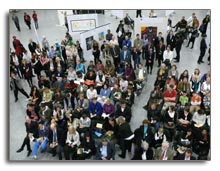 Layla Abdul-Hadi, speaking on behalf of HE Abdalla S. El-Badri, Secretary-General of OPEC which had also supported the project, spoke passionately about the importance of keeping our mother languages alive and treasuring our traditions and cultural heritage by passing them on to our children.
Layla Abdul-Hadi, speaking on behalf of HE Abdalla S. El-Badri, Secretary-General of OPEC which had also supported the project, spoke passionately about the importance of keeping our mother languages alive and treasuring our traditions and cultural heritage by passing them on to our children.
All participating schools received a certificate of participation and the audience was treated to the world premier of "Hondidlo" - an Austrian tale performed by the Talespin ensemble. Talespin 'spins' traditional folk tales, using art, music and literature to convey a global message of tolerance and intercultural understanding.